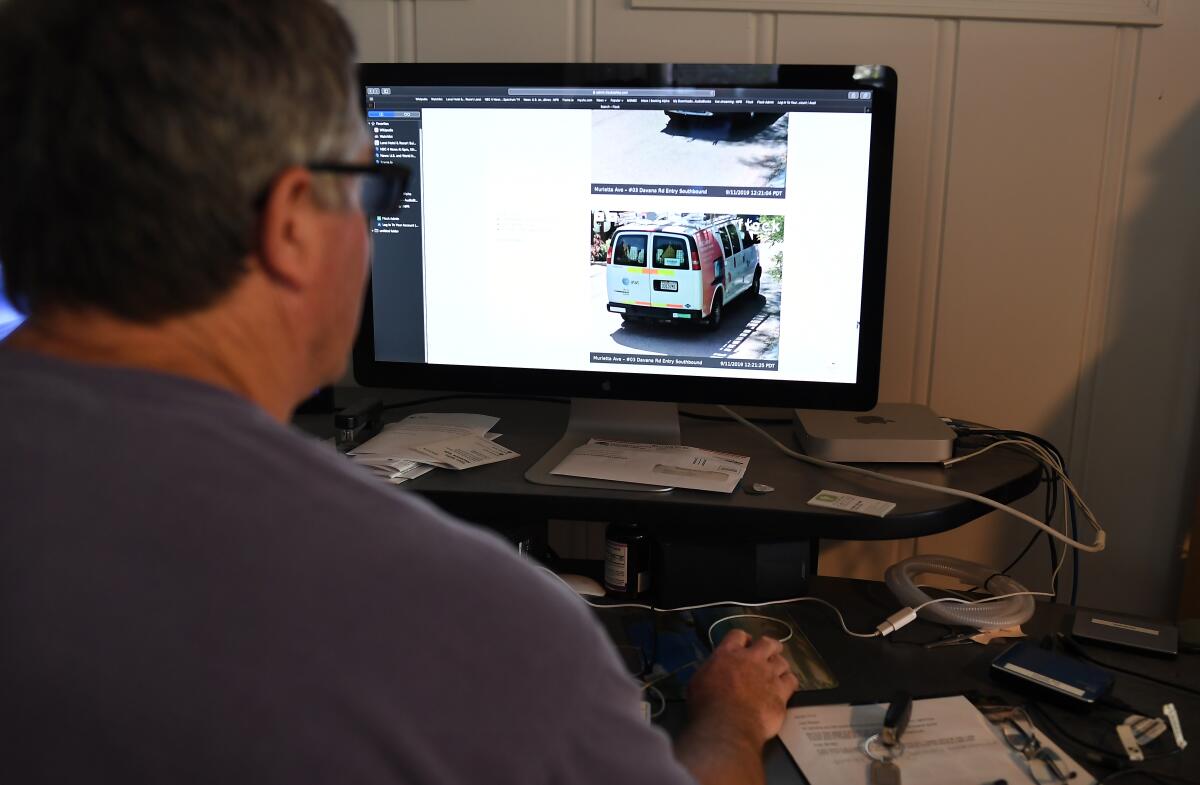Automated license plate readers to help nab burglars get the nod from La Cañada City Council

- Share via
In its ongoing efforts to reduce burglaries and other crimes that have been unnerving residents, the La Cañada Flintridge City Council directed staff Tuesday to devise an implementation plan to install automated license plate (ALPR) readers at key locations throughout the city.
Assistant City Manager Carl Alameda gave a report on the various types of equipment currently available and highlighted the benefits of Flock Safety Cameras, which have been recently tested in pilot programs run by the Los Angeles County Sheriff’s Department Technology and Support Division.
One of the advantages of the Flock cameras over other stationary ALPRs is that they can record vehicles traveling in up to two lanes, while a single, fixed ALPR can capture images from only one lane.
They are also considerably less expensive than the fixed ALPRs, which are priced at $15,000 each, plus the cost of installation. At an annual cost through a subscription agreement of $2,000 per unit, including installation, the Flock cameras are not only the most cost-effective stationary equipment with video and APLR technology, but they also are solar powered and Wi-Fi enabled. Alameda’s report indicated the total cost to the city would range from $46,000 to $72,000 annually for 23 to 36 units installed.
Los Angeles County Sheriff’s Capt. Todd Deeds, who leads the Crescenta Valley station, was asked by the City Council what he thought of the Flock units. He gave the equipment a strong endorsement, saying he was “really excited” about the help it promised law enforcement in tracking down criminals.
The implementation program is expected to be brought before the council prior to the February midyear budget review.
Two members of the audience, women who reside on Burning Tree Lane near the La Cañada Flintridge Country Club, listened closely to the discussion about the cameras. One of them told the council her home, in which she no longer feels safe, has in recent years been hit three times by burglars, “twice successfully and one unsuccessfully.” The other said that homes on either side of hers have been burglarized.
Both pleaded with the council during the public comment portion of the meeting to take preventive steps to stop the break-ins so they would not feel forced to move out of their longtime homes.
On Tuesday the City Council also
• Heard during public comments reports presented by several middle and high school members of the Global Initiatives Alliance, who asked if they could run a campaign in town to implement a four-step plan they have developed to reduce negative impacts on the environment. It was suggested they coordinate with the Youth Council to launch such an effort.
• Watched a video presented by Lien C. Yang, a Normantan Drive resident involved in the recent unsuccessful attempt to save the life of a young deer that had been hobbled by a trap. Yang implored the council to consider designating the Paradise Valley as a historical site for pioneering deer protection/rescues awareness. “This will not be the last time you hear about this,” Yang told the council.
• Heard a report from consultant David M. Ross of the Matrix Consulting Group detailing his findings on a review of practices inside the city’s Finance Department. He said the internal controls and processes in place to minimize the potential for fraud are very good, but he did provide some recommendations, including the addition of hiring the equivalent of 1.1 full-time employees.
• Listened to an update from Mayor Pro Tem Greg Brown and Councilman Jon Curtis on their work as a subcommittee assigned to give a close-up look at the Planning and Building and Safety divisions of the city’s Department of Community Development. The two recommended preparing a request for proposal from private entities that offer building and safety services to assess whether or not there could be financial benefit or efficiency gained by ceasing to use the county’s services, an arrangement that’s been in place for 40 years. The full council agreed that the subcommittee could move forward and seek proposals when ready to. Both Brown and Curtis noted there have been great strides in recent years in speeding up the development process in the city but think additional improvements might be made.
